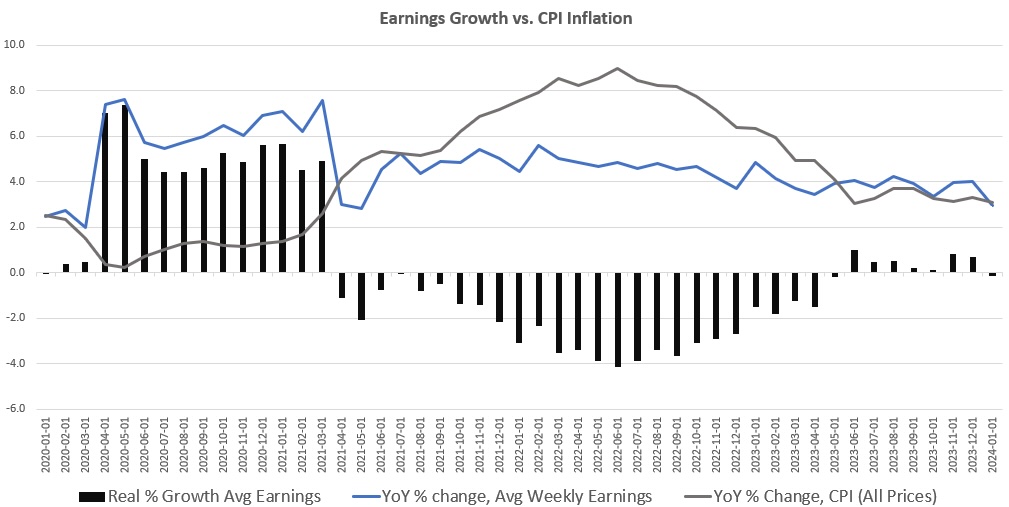While your paycheck might be a little fatter, you’re actually earning less because price inflation continues to gobble up your paycheck.
As pundits and politicians slice and dice various inflation reports, debating whether or not the Fed has finally tackled inflation, things aren’t getting any better where it really matters – in your pocketbook.
On an annual basis, average weekly earnings rose by 3 percent in January. A 3 percent raise sounds pretty good, doesn’t it? But when you factor in a 3.1 percent consumer price index, real earnings fell by 0.1 percent over the past year.
And it’s worse than that when we consider the CPI formula is designed to understate the true extent of price inflation. Measured by the formula used during the inflationary era in the 1970s, CPI would be somewhere in the neighborhood of double what the government reports today. That means your real earnings have dropped closer to 3 percent over the past year - and probably more than that.

Real wages had been clawing upward ever-so-slightly over the previous seven months, so the sudden turn back negative is a bad sign for the “inflation is over” crowd. But more significantly, it drives home the pain inflation causes for the average worker.
And even that seven months of wage recovery didn't provide a whole lot of relief given what happened over the previous two years. Real wages went negative in April 2021 and fell month after month for the next 26 months as price inflation skyrocketed.
Sadly, you’ll never get that earning power back.
Ryan McMaken summed it up in a recent article published by the Mises Wire.
All that value stolen from your dollars over the past three years? It's gone forever unless some serious deflation sets in and the value of your money actually [goes] up. The Fed is committed to making sure that never happens.
A recent Wall Street Journal article pointed out another trend that shows just how much price inflation is eating away at your purchasing power. The amount of disposable income spent on food has reached a 30-year high.
"Eating continues to cost more, even as overall inflation has eased from the blistering pace consumers endured throughout much of 2022 and 2023. Prices at restaurants and other eateries were up 5.1 percent last month compared with January 2023, while grocery costs increased 1.2 percent during the same period, Labor Department data show.
"Relief isn’t likely to arrive soon. Restaurant and food company executives said they are still grappling with rising labor costs and some ingredients, such as cocoa, that are only getting more expensive. Consumers, they said, will find ways to cope."
You’ll often hear politicians and talking heads on mainstream news outlets claim that inflation doesn’t really matter because wages rise along with prices. When it’s all said and done, it’s just a wash and you’re no worse off. Prices go up. Wages go up. Everything is fine!
But as usual, they're gaslighting you. The data shows that wages don’t rise as quickly as costs. There is always a lag, and workers are almost always playing catch-up.
And for people living on fixed incomes and savers, price inflation creates an even bigger hardship. The sad reality is the burden of price inflation tends to fall hardest on the poor and elderly.
Savers should take note. The best way to protect yourself from a constant drop in purchasing power is to hold real money - gold and silver.

About the Author:
Mike Maharrey is a journalist and market analyst for MoneyMetals.com with over a decade of experience in precious metals. He holds a BS in accounting from the University of Kentucky and a BA in journalism from the University of South Florida.





